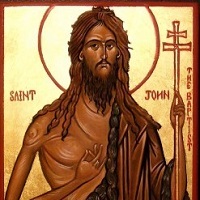
Saturday 24 June, the feast of the Nativity of John the Baptist, marks the midway point of the liturgical year.
It’s a simple construction: John’s birth is six months before Jesus. It’s a liturgical construction, not a historical one. Its purpose is to show the relationship between the Prophet and the Promise.
It could be a way of marking both the mid-winter in New Zealand and the turning point of a nation towards God. It could be an opportunity to reflect that Christmas is the festival of a promise kept. It could be an opportunity to reflect that unity is more powerful than division. It could be an opportunity to contemplate the violence that underlies our “god zone”.
John was beheaded by a fearful political ruler who was manipulated by his wife and daughter. When John spoke the truth to power he lost his head. Jesus was crucified in large part by the religious elites of his day, and by those who thought they “owned” the spirituality and ritual of their day.
A Nation Turns to God
Celebrating a national turning towards God is not possible because the people of our nation do not share a common understanding of god or divinity. More importantly, perhaps, we do not share a common understanding of truth, human value or worth, beyond the latest index of house prices.
For Voltaire, the Enlightenment had three major ideas: Reason, Individualism and Skepticism. Because we are Enlightenment thinkers—furthered through our education system—our thinking is probably more aligned to Voltaire than Jesus. The Enlightenment’s emphasis on reason shaped philosophical, political and scientific discourse from the late 17th to the early 19th century, and its impact is still with us in the 21st century.
The Englightenment was a period of huge change in thought and reason, which (in the words of historian Roy Porter) was ‘decisive in the making of modernity. Centuries of custom and tradition were brushed aside in favour of exploration, individualism, tolerance and scientific research alongside industrialisation.’
None of these are bad in themselves, but without understanding them I don’t think we can understand the tensions that abound in Aotearoa New Zealand today. The racial tensions to “keep out of my iwi”, to halt the “Māorification of NZ” and the use of Te Reo on street signs.
Our Notion of Divinity and Sacred Violence
In Aotearoa, New Zealand, the notion of divinity covers the range from animist to judeo-christian, to pantheism, to individual secularism and each of these “religions” nurtures a “sacred violence” that often becomes a “sacred grievance”.
“Sacred violence” marks out no-go areas for others. Where this happens, reasonable opinion and disagreement are prevented and people or ideas are “cancelled” and sacred texts or rituals are used to justify violent responses.
In time, the “sacred violence” becomes the “sacred grievance” and the only lens through which aggrieved people “read” the world around them: “Fr X didn’t take my call, visit my parents, or ask me to join the choir all priests are bad, sad, mad and to be hated”.
No one is immune from ‘sacred violence’. This is the violence that “others” people and turns people against each other.
No one is immune from using “sacred violence” on others, and no one is immune from suffering it.
Many people have suffered a “sacred violence” and we would say they rightly have a “sacred grievance”.
However, the message of Christ (read 1 John, 4:7-16) is that love, because it comes from God, reveals the true nature of God in Christ.
Because “God is love, anyone who lives in love lives in God and God in him or her”. The challenge for believers in Christ is to challenge the sacred violence in themselves and their society. If we don’t stop acting out of violence and grievance then why should anyone listen to us?
Living out of love challenges Christians to see their role in the perpetuation of sacred violence, othering” and sacred grievances.
Love challenges those of us who have been sinned against to stand with the eternal victim as the icons of healing, through love and forgiveness.
The love needed is not an emotional “let’s be nice to each other” sort, but a sacrificial love that makes room for each person in non-violent ways by seeking to be fundamentally non-violent.
Too Tiny
The problem for our country, as for the local Church, is its leadership, or the lack thereof.
In these, as in most things, we suffer from the tyranny of tininess.
For example, airfares from a provincial city to a metropolitan one are unaffordable because we’re too tiny to have an effective and sustainable duopoly of the sky.
Having no shared worldview, and being small, we will forget that our situation is not new and because we forget this we will fall into the same trap as other peoples have throughout the millennia.
Our divisions will grow because there is “no prophet to teach and no prince to lead”: The bars of her gates have been shattered, and the gates themselves have sunk into the ground. Her king and her princes are in exile among the Gentiles; there is no instruction any longer from priests, and her prophets have not received any vision from the Lord. (Lamentations 2:9)
The tyranny of tininess already stops us from being able to see the dangers of what we are doing and how we are speaking, because our reference points for reflection are few and small.
The intertwining of the stories of John the Baptiser and Jesus the Messiah are worth pondering.
Fr Joe


